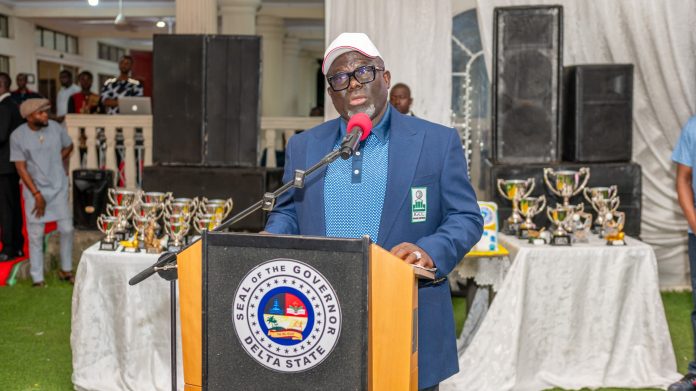A quiet revolution is unfolding across Delta State, reaching deep into its most remote communities—from mangrove-lined riverine belts to dusty hinterland roads.
Governor Sheriff Oborevwori is delivering on his promise to do more, bringing sustainable infrastructure and meaningful development to rural and riverine areas long neglected.
Since assuming office on May 29, 2023, Oborevwori has made rural and riverine development a cornerstone of his MORE Agenda—Meaningful Development, Opportunities for All, Realistic Reforms, and Enhanced Peace and Security. His commitment is evident not just in policy pronouncements, but in the visible, transformative projects now reshaping daily life across the state.
Working through the Ministry of Works (Rural Roads), the state government has launched an aggressive road construction and rehabilitation campaign.
Rural roads that were once impassable are being rebuilt into smooth, motorable routes—improving access to markets, schools, and healthcare services.
In communities in Aniocha North, Ukwuani, Isoko North and South, and Ndokwa, residents are now experiencing the real dividends of democracy. Projects like the Emevor–Orogun Road Phase 1 & 2 and the Olomoro– Igbide Road in Isoko North and South local government areas, respectively are emerging as vital lifelines, facilitating the swift movement of agricultural produce and stimulating economic activity. Roads in Bomadi and Patani—previously accessible only during the dry season—now offer year-round connectivity, thanks to strategic upgrades.
The State Government is working on the Uduophori Road, building schools, and providing water, the 47km Ohoror–Bomadi Road is ongoing. In the EXCO meeting, the government approved the Bomadi–Gbaregolor Road (18.6km) and reconstruction of the Okontu–Ogulaha Road (12.5km) in Burutu Local Government Area.
In Warri South-West, internal roads in Benikrukru and Okerenkoko, as well as the Okerenkoko–Kokodiagbene–Pepe-Ama Road, are underway. The Ogbudugbudu–Ogbeinbiri Road in Warri North and the massive Trans Warri–Ode-Itsekiri Road and bridges are also progressing. The latter is being executed under an Irrevocable Standing Payment Order (ISPO) model, allowing the state to pay over a billion naira monthly to ensure timely completion.
Rural communities in the state are no longer afterthoughts. The Governor has instructed that no community be left behind in the development efforts of his administration.
In historically neglected riverine areas—long sidelined by difficult terrain and prohibitive costs—the Oborevwori administration is pioneering transformative infrastructure through the newly created Ministry of Riverine Infrastructure. Projects such as building of jetties, dredged canals, water-transport terminals and internal roads—all designed to knit remote communities more closely into Delta’s economic and social life, are being embarked on.
In Burutu, Gbaramatu and Ogulagha Kingdoms, jetties are now making movements easy and boosting economic activities in the area. The Ayakoromo and Ogbe-Ijoh jetties are revolutionizing daily life. Students can reach schools more easily, traders can access wider markets, and patients can get to hospitals without endless delays. The Governor Sheriff Oborevwori’s administration understands that development must be inclusive. These jetties do more than move boats—they restore dignity and open doors of opportunity.
On land, progress is equally visible. The Oko- Amakom–Oko-Obiokpu road is now 65 percent complete, while work is under way on the Bomadi–Gbaregolor, Ohoror–Bomadi and Orere Bridge corridors in Delta Central. In Ndokwa, critical upgrades are reshaping the Eweshi–Utagba-Uno, Ndemili–Utagba-Uno and Inam–Abbi routes—delivering safer, faster connections for farmers, traders and commuters alike. The Obi-Ibabu Road, the Beneku Bridge and others in that area, have added value to the socio-economic lives of the people.
Clean water and healthcare innovations are following suit. In Burutu, Bomadi, Ndokwa East, and other areas, solar-powered boreholes now serve thousands who once relied on polluted streams. Floating health clinics in Ogulagha and Benikrukru bring immunizations, maternal care and routine check-ups to communities cut off by waterways—and inland health centres are being upgraded with modern equipment and outreach programmes.
Governor Oborevwori insists this is no one-off intervention but a sustained commitment. Plans are already in motion for new bridges; shoreline-protection works to stem erosion, and a unified water-transport safety policy to reduce accidents. Despite fiscal constraints, his administration is determined that rural and riverine Deltans will never again be treated as afterthoughts.
Two years in, this strategy has done more than erect roads and jetties—it has rebuilt trust. A fish seller in Ogidigben now preserves her catch longer, thanks to quicker market access. A health worker in Esama, Ughelli South, reaches patients in minutes, not hours, on freshly tarred roads. These quiet transformations—measured in lives improved rather than headlines made—are the hallmarks of a government that listens and delivers.
“Infrastructure is not a political favour; it is a social contract,” Governor Oborevwori often reminds his team. Each jetty, borehole, road and health centre is proof that equity and opportunity matter here as much as they do in any city.
In a nation where progress often stalls at urban boundaries, Delta State is now charting a new course—one jetty, one borehole, one road at a time.


